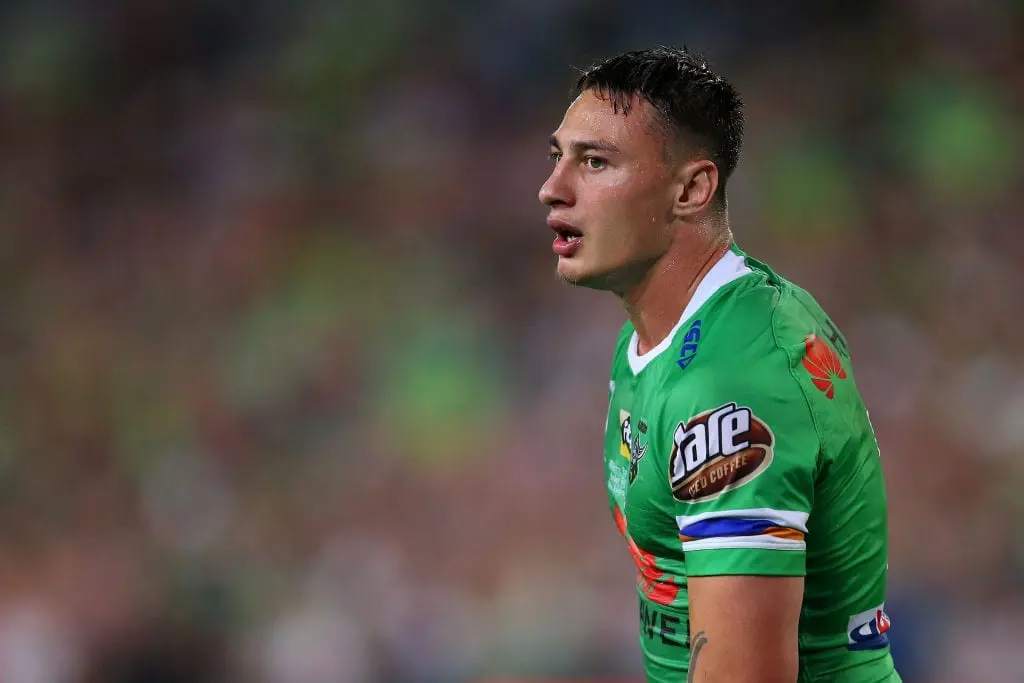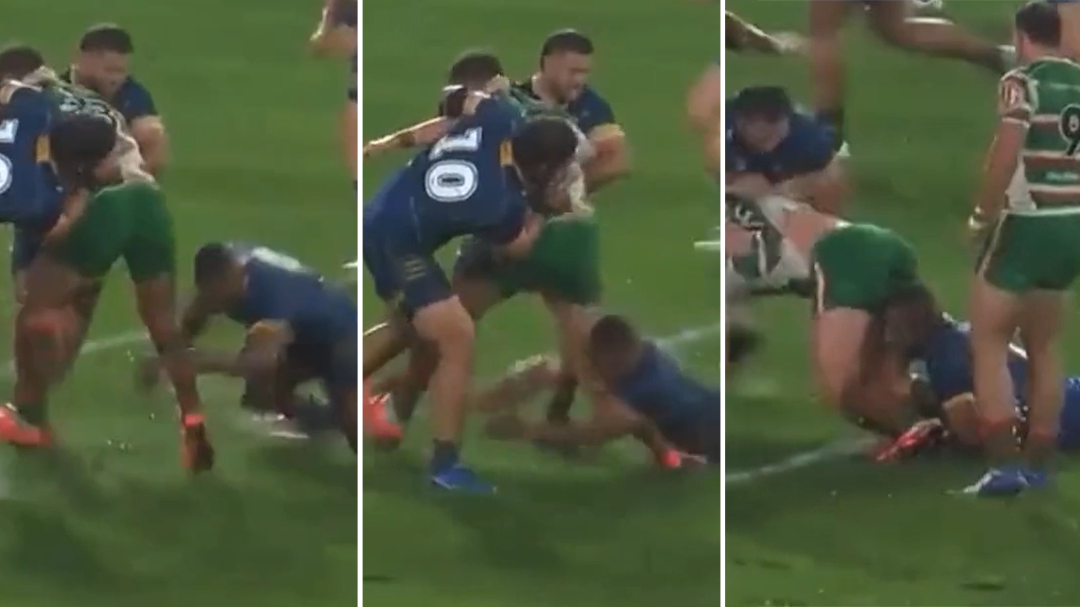They're the big NRL issues generating discussion on the socials and in the fan forums this week, and everyone has an opinion. So let's dive right into ours.
Breaking contracts and changing colours
With news that Reece Walsh will be returning home to the Broncos, and that Charnze Nicoll Klokstad (and potentially) Te Maire Martin will be shifting to the Warriors, social media is buzzing about player loyalty, the point of a contract and the 'shoot now, ask questions later' nature of signing available players.
While Broncos fans were booing in reaction to Payne Haas' requests for release to chase the coin, over at Broncos HQ fan forum, there's nothing but excitement for Walsh cutting his final contracted year at the Warriors short and making the shift to Red Hill.
Walsh's move comes only eight weeks after declaring that he'd fulfil his dedication to the Warriors and play on in 2023.
At the end of the day, fans are fickle, and players play the game ultimately to earn a living. Only in sport do we berate those who change allegiances and welcome with open arms those who we had previously booed.
In every other corporate industry, employees are head-hunted and many spend every other day scanning Seek for their next opportunity, contracts be damned. Players deserve to put their families, futures and bank accounts first, but fans deserve to make a noise when they don't like it. Such is the nature of a career in sport.
Cannonball!
The latest NRL meta-language word to emerge and demand an immediate knee-jerk reaction, like the 'chicken-wing' and 'crusher' tackles before it, the 'cannonball' tackle has sent a lot of players to the sideline this year, with Liam Knight's season finishing up after copping a nasty one down low.
NRL commentators are furiously trying to align themselves to a position, when at the end of the day, it's a tackle that has always existed and only becomes a cannonball when the technique goes wrong.
It provokes the same old questions about how long an offender should be suspended for and whether it should be somehow related to how injured the ball-runner is.
Thus, we get tangled up in trying to define on the run, apply labels, categories and levels, and stipulate penalties. But just with every aspect of the game, the call should be left to the referee on the field and how he or she first responds, based on their assessment of intent, malice or simply sloppiness in technique.
One area that still goes largely unnoticed is player injuries resulting in ball-runners fending with their hands and elbows to the defender's heads and it will be interesting to see if that ever gets the same level of hype and hysteria.
Eligibility for Origin vs Desire to play for country
While the rules regarding Origin eligibility are pretty clear (just ask Ronaldo Mulitano), there has been a furore surrounding players including NSW's Jerome Luai and Brian To'o pledging their allegiance to Samoa over Australia for end of year test matches.
Many areas of the game are commonly subjected to 'tradition', particularly when it comes to the positions of the game's longest-serving commentators and opinion columnists.
Over time, State of Origin has been an audition for a green and gold jumper. But with such high current representation of Pasifika players in the NRL, and the relatively recent emergence of test teams that are now growing in stature, like Samoa and Tonga (1986), many players (who are only in their twenties, generally) are hearing the anthem of their home countries and pledging their devotions.
If a player has grown up in Australia but has alternative heritage, they should make their own choice.
As a Kangaroos supporter, I'd prefer players who want to play for Australia playing for Australia. Huge talents like To'o and Luai playing for their families' country will only enhance and strengthen the international rugby league platform.
NRL 'culture'
So much talk about under-performing clubs like the Wests Tigers, Gold Coast Titans and New Zealand Warriors is about having 'culture' issues at the heart of their failures. But it feels like such a throw-away term that columnists rarely want to delve further into.
Surely a player with 'poor culture' can change, and a team with 'positive culture' can fall.
It would be hard to identify a single club where (to list a few):
- Every player respects every other player and trusts them fully on and off the field.
- No off-field incident or other scandals or charges are tied with any players.
- Every player on the team wants the success of the team to come before their own personal success.
- Every player on the team fully respects the coach and captain.
- The coach has not blown up in a media conference, whinging about referees and other players.
- Every player commits fully to their contracts.
- Every player is respectful of the referee and opposition players during matches.
- Nobody leaks private or personal stories to the media.
- Every player is engaged and committed to community outreach and volunteer work.
- Players who are not performing put their hands up to spend time in lower grades without waiting to be tapped on the shoulder.
So when a particular player with 'poor culture' joins a team with supposed 'impeccable culture', it's hard not to feel that both labels are fluid.
People at all levels within a club need to feel as though they are performing for not only themselves and their team, but also their fans - who are often the most affected when their team is dragged through the muddy media - not just when they're losing matches.









“Players deserve to put their families, futures and bank accounts first,”
Players do not deserve to be able to walk away from their contracts, any more than clubs can. If, for example, Wests decided Luke Brooks was not playing well enough to deserve his salary, and told him that they were going to stop paying him and were releasing him from his contract, what would happen?
The RLPA would be up in arms. The player would lawyer up and demand that the contract be honoured.
But the reverse is not the case, and will not be the case until the NRL takes some serious action. For example:
– refusing to register a contract for any greater value than the one from which the player has walked away.
– introducing a transfer system whereby if a player walks out on a contract, his next club pays a “transfer fee” equal to (say) 50% of the value left on the contract at the old club – and that “transfer fee” has to be fitted under the salary cap.
You say “In every other corporate industry, employees are head-hunted and many spend every other day scanning Seek for their next opportunity, contracts be damned”.
Three points:
– the percentage (of any given industry) who are head-hunted is small,
– the percentage that spend every other day just looking for new jobs is equally small: unless they actually deliver, they are likely to get shown the door.
– regardless of whether a guy is head-hunted or finds an opportunity on SEEK, he has to have the references from past employers to attest to his skill and character. You can only get so far without them.
That does not hold in sport: character counts for little or nothing – all that matters is the perceived ability to play well. That is a crucial difference, and that is what greedy players (and their equally greedy managers) are exploiting. That is what fans do not like.
Some fair points, however:
1. Clubs do ask players to leave, and when that happens, they either pay their freight or share it with the player’s new club. When it is the player seeking separation, they do not expect the club to continue paying them. It is not accurate to suggest that clubs always allow their contracted players to see out the full term.
2. I like your ‘transfer fee’ idea and I agree that something needs to be done about NRL contracts – to protect players and also clubs.
3. The percentage of players in the NRL who are approached/poached by other clubs is similarly small, as is the percentage of disgruntled/dissatisfied players starting to look at possible exit strategies.
4. The suggestion that references from previous employers is applicable to the NRL is probably a moot point, in that a Sales Associate would need a previous employer to verify KPI’s, attendance, growth and so on. NRL clubs don’t necessarily require statements of referee from former clubs as the large majority of what players bring is shown in the media and in the actual matches.
Overall, players should be left to do what is best for them and if it is acting within the existing boundaries of the game, then power to them. To protect the integrity of the game, I agree with you in that things need to be done to codify contractual obligations. I’ll use Payne Haas as an example: he figured that his performances and the club’s position on the ladder meant that he was worth more than what he was getting, and he sought a way out to find a club that would pay him more. The large majority of stakeholders and fans saw this as a low act and he copped it from every angle, deservedly so. But clubs see beyond his off-field demeanours and his God-complex and they know his talent and work ethic on and off the field. They’d still be lining up to sign him, regardless of what others think.